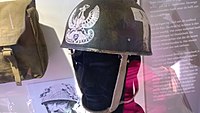Helmet Steel Airborne Troop
The Helmet Steel Airborne Troops (HSAT) is a paratrooper helmet of British origin worn by paratroopers and members of airlanding units. It was introduced in Second World War by the British Army and was also used by other Commonwealth armies. It was also used in the post-war era – until the Falklands War, in the case of British airborne troops. As with the similarly shaped RAC helmet, it was initially manufactured by Briggs Motor Bodies at Dagenham.

Variants
The first prototype variant was used during the Bruneval Raid, these came with a rubber padding found on the rear. The helmets were short lived and replaced by the MkI.
The first steel helmet was produced at the BMB factory in 1941. These early "P Type" helmets only numbered between 500 and 1,000 units. The P Type featured a non-magnetic manganese steel shell with a rubberized rim and a lining with interior padding that was similar to the German M36/40 design.
Mk I
The next step in the evolution of the British helmet came in 1942. This helmet featured a similar shell design, but with a thick vulcanized fiber band rim that clearly distinguishes it from the German model, along with a four-point chinstrap system and a band of sorbo rubber for padding. These earliest helmets used leather chins traps and are considered quite rare.

Mk II
Second pattern, came with the same leather chinstraps and a steel rim instead of the fibre rim (issue October 1942).
Mk III
Third pattern, came with the three-point webbing chinstrap. This variant was also used after the Second World War, up to the Falklands War. Some of the chinstraps were later used on the modern day kevlar para helmet.
Users

References
| Wikimedia Commons has media related to Helmet Steel Airborne Troop. |
Websites
- World War II British Airborne arnhemjim.blogspot.com
- "Helmet used by SAS in France in 1944". iwm.org.uk. Retrieved 7 December 2017.
- "Steel Helmet, Royal Armoured Corps pat. (with net)". iwm.org.uk. Retrieved 7 December 2017.